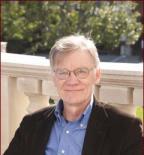David Blight
David W. Blight joined the faculty at Yale in January 2003. He is one of the nation’s foremost authorities on the US Civil War and its legacy. As of June, 2004, he is Director, succeeding David Brion Davis, of the Gilder Lehrman Center for the Study of Slavery, Resistance, and Abolition at Yale. During the 2006-07 academic year he was a fellow at the Dorothy and Lewis B. Cullman Center for Writers and Scholars, New York Public Library.
Blight is the author of American Oracle: The Civil War in the Civil Rights Era (Harvard University Press, 2011) and A Slave No More: Two Men Who Escaped to Freedom, Including Their Narratives of Emancipation, (Harcourt, 2007), this book combines two newly discovered slave narratives in a volume that recovers the lives of their authors, John Washington and Wallace Turnage, as well as provides an incisive history of the story of emancipation. In June, 2004, the New York Times ran a front page story about the discovery and significance of these two rare slave narratives. Blight is also the author of Race and Reunion: The Civil War in American Memory (Harvard University Press, 2001), which received eight book awards, including the Bancroft Prize, the Abraham Lincoln Prize, and the Frederick Douglass Prize as well as four awards from the Organization of American Historians, including the Merle Curti prizes for both intellectual and social history. Other published works include a book of essays, Beyond the Battlefield: Race, Memory, and the American Civil War (University of Massachusetts Press, 2002); and Frederick Douglass’s Civil War: Keeping Faith in Jubilee (LSU Press, 1989). Blight is the editor of and author of six books, including When This Cruel War Is Over: The Civil War Letters of Charles Harvey Brewster (Univ. of Massachusetts Press, 1992); Narrative of the Life of Frederick Douglass, An American Slave (Bedford Books, 1993); co-editor with Robert Gooding-Williams, W.E.B. Du Bois, The Souls of Black Folk (Bedford Books, 1997); co-editor with Brooks Simpson, Union and Emancipation: Essays on Politics and Race in the Civil War Era (Kent State Univ. Press, 1997); and Caleb Bingham, The Columbian Orator (orig. 1797, NYU Press, 1997), the book of oratory and antislavery writings that Frederick Douglass discovered while a youth. The edited volume, Passages to Freedom: The Underground Railroad in History and Memory, was published by Smithsonian Press in 2004 and is the companion book for the opening of the National Underground Railroad Freedom Center in Cincinnati.
Blight is also a frequent book reviewer for the Washington Post Book World, the Chicago Tribune, the Los Angeles Times, the Boston Globe and other newspapers, and has written many articles on abolitionism, American historical memory, and African American intellectual and cultural history. He is one of the authors of the bestselling American history textbook for the college level, A People and a Nation (Houghton Mifflin). He is also series advisor and editor for the Bedford Books series in American History and Culture, a popular series of teaching books for the college level. Blight lectures widely on Douglass, Du Bois, and problems in public history and American historical memory. He teaches summer institutes for secondary teachers and for park rangers and historians in the National Park Service, devoting a good deal of time to these and many other public history initiatives.
Blight has also been a consultant to several documentary films, including the 1998 PBS series, “Africans in America,” and “The Reconstruction Era” (2004). Blight has a Ph. D. from the University of Wisconsin-Madison, and did his undergraduate degree at Michigan State University. He has also taught at Harvard University, at North Central College in Naperville, Illinois, and for seven years was a public high school teacher in his hometown, Flint, Michigan. He was also senior Fulbright Professor in American Studies at the University of Munich in Germany in 1992-93.
Blight was elected as a member of the Society of American Historians in 2002. Since 2004 he has served as a member of the Board of Trustees of the New York Historical Society and the board for African American Programs at Monticello in Charlottesville, Virginia. He also serves on the board of advisors to the Abraham Lincoln Bicentennial Commission and is involved in planning numerous conferences and events to commemorate both the Lincoln anniversary and the sesquicentennial of the Civil War. In his capacity as director of the Gilder Lehrman Center at Yale, Blight organizes conferences, working groups, lectures, the administering of the annual Frederick Douglass Book Prize, and many public outreach programs regarding the history of slavery and its abolition. Blight is also an advisor to the September 11 Memorial and Museum in New York.
Professor Blight previously taught at Amherst College for 13 years. He earned his PhD from the University of Wisconsin- Madison and then taught at Harvard and at North Central College in Naperville, Illinois. Before his university career, he taught for seven years in a public high school in his hometown of Flint, Michigan. His courses include seminars in nineteenth-century U.S. history, African- American history, and historical memory.
